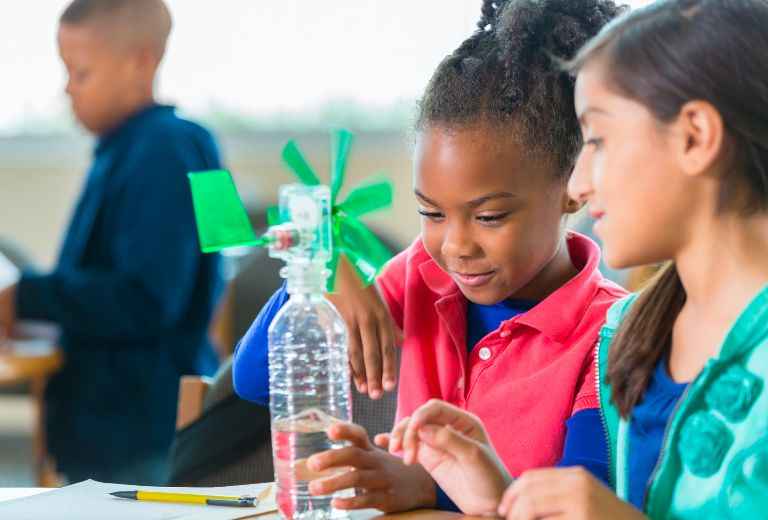
The Transformative Influence Of Pretend Play in Childhood Development
Pretend play is a critical component of childhood development, allowing children to explore different roles, emotions, and situations in a safe and imaginary environment. Through pretend play, children develop important cognitive, social, and emotional skills, such as problem-solving, empathy, and creativity. This type of play also helps children make sense of the world around them and practice important social skills, ultimately contributing to their overall development and well-being.

Mejbahul Alam
Writer
PUBLISHED ONJan 30, 2024
In a world driven by technology and structured education, the value of pretend play often gets overlooked. However, research consistently highlights the pivotal role it plays in childhood development. From cognitive benefits to fostering innovation, the power of make-believe cannot be underestimated. In a society driven by technological advancements and formal education, the importance of imaginative play is frequently underrated. Nevertheless, studies consistently emphasize the significant impact it has on early development. From cognitive advantages to stimulating original thinking, the significance of pretend play should not be underestimated.
The Essence of Pretend Play in Childhood Development
Pretend play, also known as imaginative or symbolic play, is an essential aspect of childhood development. It allows children to explore their creativity, problem-solving skills, and social interactions. By engaging in pretend play, children are able to use their imaginations to create and act out various scenarios, which in turn helps them to develop language, cognitive, and emotional skills. Through pretending to be different characters and engaging in role-playing activities, children can better understand different perspectives and emotions, thus enhancing their empathy and social understanding.

Pretend play allows children to practice and develop their communication and cooperation skills as they engage in interactive play with their peers. Furthermore, it provides them with the opportunity to experiment with different roles, responsibilities, and social etiquettes. Overall, the essence of pretend play in childhood development is undeniable as it not only fosters creativity and imagination but also supports the development of various cognitive, emotional, and social skills essential for a child's overall growth and well-being.
Pretend Play in Childhood Development
- The Essence of Pretend Play in Childhood Development
- Fostering Innovation Through Creative Play
- The Role of Parents in Nurturing Creative Play
- Overcoming Challenges: Embracing the Messiness of Creativity
- Some Questions and Answers
- How does pretend play contribute to a child's cognitive development?
- What role does emotional intelligence play in pretend play?
- Can pretend play contribute to real-world innovation?
- How can parents encourage pretend play at home?
- Are there concerns about the messiness of pretend play, and how can they be addressed?
The Cognitive Benefits of Imaginary Worlds
Pretend play provides a platform for children to engage in imaginative scenarios. Whether they are playing house, creating fantastical worlds, or taking on roles, their cognitive abilities are put to the test. This form of play enhances problem-solving skills, spatial awareness, and the ability to think critically. Engaging in make-believe scenarios allows children to use their imagination and creativity. Whether they are pretending to be in a specific role, creating imaginary places, or playing house, they are challenging their cognitive skills. This type of play improves their problem-solving abilities, spatial awareness, and critical thinking.
Emotional Intelligence and Pretend Play
Beyond cognitive development, pretend play contributes significantly to emotional intelligence. Children learn to navigate social scenarios, understand emotions, and develop empathy. Through the exploration of different roles and emotions in their imaginary worlds, they build a foundation for healthy social interactions. In addition to cognitive growth, make-believe play plays a crucial role in nurturing emotional intelligence. Youngsters acquire the ability to handle social situations, comprehend feelings, and foster compassion. By immersing themselves in various roles and emotions in their make-believe realms, they establish the groundwork for positive social connections.
Fostering Innovation Through Creative Play
Fostering innovation through creative play is essential in cultivating a dynamic and forward-thinking mindset. When individuals are encouraged to engage in imaginative and playful activities, they are able to think outside the box, experiment, and explore new possibilities. Creative play stimulates the brain, fosters curiosity, and allows for the development of unconventional ideas and solutions. By embracing a playful approach to problem-solving and brainstorming, individuals are better able to tap into their creativity and come up with innovative concepts.
Creative play can also foster collaboration and communication among team members, as it encourages them to work together, share ideas, and build off of each other's creativity. Allowing room for creative play in the workplace or educational setting not only has the potential to inspire groundbreaking innovations, but it also promotes a positive and motivating environment that encourages individuals to think freely and confidently. Ultimately, fostering innovation through creative play can lead to transformative breakthroughs and foster a culture of creative thinking.
From Make-Believe to Breakthroughs
Innovation often stems from the ability to think outside the box. Pretend play lays the groundwork for this kind of thinking. As children immerse themselves in creative scenarios, they learn to approach challenges with a fresh perspective, setting the stage for future innovation. Being innovative frequently originates from the capacity to think unconventionally. Engaging in imaginative role-play provides the foundation for this type of thinking. As kids fully engage in imaginative situations, they develop the skill to tackle obstacles with a new outlook, preparing the way for future innovation.
Problem-Solving Skills in the World of Make-Believe
The imaginary problems children encounter during playtime require solutions. This process of creating and resolving challenges enhances their problem-solving skills. These skills, when nurtured, become essential tools for overcoming real-world obstacles later in life. Children's make-believe difficulties in playtime necessitate finding answers. This act of developing and solving problems improves their ability to solve problems. These abilities, if cultivated, become crucial instruments for overcoming actual difficulties in the future.
The Role of Parents in Nurturing Creative Play
The role of parents in nurturing creative play is essential in a child's development. Parents can provide an environment that encourages imaginative play by providing open-ended toys, art materials, and outdoor spaces for exploration. They can also participate in their child's play by engaging in pretend play, storytelling, and art activities, which helps to spark their child's creativity and imagination.
Parents can offer praise and support for their child's creative endeavors, helping to build their confidence and self-expression. Setting aside dedicated time for creative play and limiting screen time can also foster a child's imagination and problem-solving skills. By actively participating and supporting their child's creative play, parents play a crucial role in fostering their child's cognitive, emotional, and social development. Ultimately, the role of parents in nurturing creative play lays the foundation for their child's lifelong love of learning and innovative thinking.
Encouraging Pretend Play at Home
Parents play a crucial role in fostering pretend play. Providing a supportive environment where children feel encouraged to use their imagination is vital. Simple acts, like supplying props or engaging in pretend play with them, can make a significant impact. The involvement of parents is essential in encouraging make-believe play. It is important to create a nurturing atmosphere that allows children to freely use their creativity. Small gestures, such as offering toys or participating in imaginative play, can have a profound effect.
Choosing the Right Toys for Imaginative Development
Selecting toys that encourage creativity is key. Open-ended toys, such as building blocks, art supplies, and dress-up clothes, allow children to explore various scenarios. Limiting screen time and promoting hands-on, imaginative play is essential for holistic development. Choosing toys that promote creativity is crucial. Toys that don't have a specific purpose, like construction blocks, art materials, and dress-up costumes, give kids the ability to imagine and try out different situations. It's important to reduce the amount of time children spend in front of screens and instead encourage them to engage in hands-on, creative play for their overall development.
Overcoming Challenges: Embracing the Messiness of Creativity
Creativity can often feel messy and chaotic, but embracing the messiness is essential for overcoming challenges and truly tapping into one's creative potential. When we are willing to accept the disorganization and uncertainty that comes with the creative process, we open ourselves up to new possibilities and breakthroughs. By letting go of the need for perfection and control, we allow ourselves to take risks and explore uncharted territory. Embracing the messiness of creativity means being open to failure and learning from our mistakes, understanding that it is all part of the journey towards innovation.
It requires embracing ambiguity and finding comfort in the unknown, knowing that it is all part of the process of creation. When we learn to welcome the messiness of creativity, we free ourselves from self-imposed limitations and open ourselves up to new ideas and inspiration. Instead of striving for perfection, we can focus on the joy and fulfillment that comes from the unpredictable and often chaotic nature of the creative process.
Addressing Concerns About Pretend Play
Some parents may express concerns about the messiness or chaos associated with pretend play. It's crucial to understand that this messiness is a part of the creative process. Embracing it allows children to express themselves freely without constraints. Certain parents might have worries about the disorder or untidiness linked with make-believe games. It's important to recognize that this disorder is a component of the imaginative process. Embracing it enables kids to openly express themselves without limitations.
Benefits Outweighing the Chaos
While the messiness may seem daunting, the benefits of pretend play far outweigh any temporary inconveniences. The skills acquired during imaginative play contribute significantly to a child's overall development, preparing them for success in various aspects of life. Although the chaos may appear overwhelming, the advantages of make-believe games surpass any momentary troubles. The abilities learned through creative play greatly impact a child's complete growth, equipping them for achievement in different facets of life.
Some Questions and Answers
How does pretend play contribute to a child's cognitive development?
Pretend play engages a child's imagination, enhancing problem-solving skills, spatial awareness, and critical thinking.
What role does emotional intelligence play in pretend play?
Pretend play fosters emotional intelligence by allowing children to navigate social scenarios, understand emotions, and develop empathy.
Can pretend play contribute to real-world innovation?
Absolutely. Pretend play lays the groundwork for innovative thinking, encouraging children to approach challenges with creativity.
How can parents encourage pretend play at home?
Parents can encourage pretend play by providing a supportive environment, offering open-ended toys, and actively engaging in imaginative play with their children.
Are there concerns about the messiness of pretend play, and how can they be addressed?
While concerns about messiness may arise, it's crucial to understand that the benefits of pretend play far outweigh the temporary chaos. Embracing the messiness is part of nurturing creativity.
The power of pretend play in nurturing creativity and innovation cannot be overstated. As parents and caregivers, embracing and encouraging this form of play is an investment in a child's holistic development. From cognitive benefits to emotional intelligence and problem-solving skills, the impact of imaginative play resonates throughout a lifetime. So, let the world of make-believe unfold, and watch as creativity transforms into a powerful force in your child's life. The significance of pretend play in fostering creativity and innovation cannot be emphasized enough.
For parents and caregivers, supporting and promoting this type of play is a valuable contribution to a child's overall growth. With advantages ranging from cognitive development to emotional awareness and problem-solving abilities, the influence of pretend play lasts a lifetime. Therefore, allow the realm of imagination to unfold, and observe as creativity evolves into a formidable influence in your child's life.
Share
More Blog Articles

Jan 31, 2024
How Creativity Impacts Child Development
The key points from a recent study on the effects of technology on children's learning and development. It outlines the benefits and drawbacks of technology usage, as well as recommendations for parents and educators. The study emphasises the importance of balanced and mindful use of technology in children's lives.
READ MORE

Jan 29, 2024
The Power of Physical Play
"The Power of Physical Play" explores the importance of physical activity in the development of children. The content discusses how engaging in play helps children learn, develop motor skills, and build social relationships. It also emphasises the role of physical play in enhancing cognitive abilities and promoting overall well-being. We provide practical tips and activities for parents, educators, and caregivers to incorporate more physical play into children's daily routines.
READ MORE
